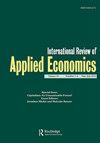Productivity, equity, and sustainability: A trilemma for contemporary human development?
IF 1.6
Q3 ECONOMICS
引用次数: 0
Abstract
ABSTRACT Productivity, equity and sustainability are regarded as ‘essential components’ in the human development paradigm. They reflect structural aspects of an economic system and create the material conditions for widespread human development and wellbeing. Nevertheless, the consistency among these principles is significantly questioned in the economic literature, depicting a potential ‘trilemma’ for contemporary human development. This paper analyses the ability of different economies to consistently advance productivity, equity, and sustainability. A new composite indicator – the Human Development Structural Consistency (HDSC) index – is introduced to measure the integrated performance in productivity, equity and sustainability of 66 economies from 2006 to 2019. The analysis shows a general progressive improvement in the ability of economies to advance the three structural components of human development consistently, although the three measures continue to appear incompatible with each other, whereby the process of economic growth is still associated with rising environmental degradation and a weak contrast to inequalities. This paper discusses the possible policy solutions to this ‘trilemma’, such as the structural changes necessary to ensure that improvements in productivity are accompanied by rising equity, sustainability, and effective human wellbeing.生产力、公平和可持续性:当代人类发展的三难选择?
本文章由计算机程序翻译,如有差异,请以英文原文为准。
求助全文
约1分钟内获得全文
求助全文
来源期刊

International Review of Applied Economics
ECONOMICS-
CiteScore
4.30
自引率
4.50%
发文量
37
期刊介绍:
International Review of Applied Economics is devoted to the practical applications of economic ideas. Applied economics is widely interpreted to embrace empirical work and the application of economics to the evaluation and development of economic policies. The interaction between empirical work and economic policy is an important feature of the journal. The Journal is peer reviewed and international in scope. Articles that draw lessons from the experience of one country for the benefit of others, or that seek to make cross-country comparisons are particularly welcomed. Contributions which discuss policy issues from theoretical positions neglected in other journals are also encouraged.
 求助内容:
求助内容: 应助结果提醒方式:
应助结果提醒方式:


